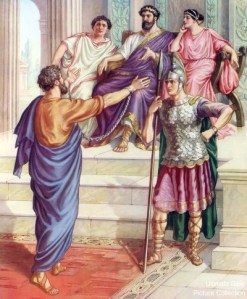DAY ONE HUNDRED AND EIGHTY-EIGHT : 2 Kings 14 v. 23 – 15 v. 38; Acts 25 v. 23 – 26 v. 23; Proverbs 16 v. 18 – 27
2 KINGS
Jeroboam II King of Israel – bad king of Israel, reigning 41 years, continuing the evil his forefathers had been guilty of; however, God saw the plight and suffering of the Israelites, and under Jeroboam, extended their boundaries, and saved them from their enemies. He recovered Damascus and Hamath which had been taken by Yaudi. Read more about Jeroboam in the annals of the kings of Israel…he is succeeded by his son, Zechariah.
Azariah King of Judah – became king of Judah when he was just 16 years old and reigned for 52 years. (His mum is named – Jecoliah, from Jerusalem). A good king, doing right in the eyes of God, although the ‘high places’ remained where people offered sacrifices. Azariah had leprosy throughout his life, and lived apart from others, whilst his son, Jotham looked after the palace and governed the people. Read more about Azariah in the annals of the kings of Judah…he is succeeded by his son, Jotham.
Zechariah King of Israel – another bad king of Israel (‘doing evil in the eyes of the Lord’), only reigning for six months. He is conspired against by Shallum, and is assassinated. It is a fulfilment of a prophetic word generations before to Jehu, that his family line would rule for just four generations.
Read more about Zechariah (though there can’t be much to read for just six months!) in the annals of the kings of Israel.
Shallum King of Israel – Shallum only reigns for one month !! He is attacked by Menahem, is assassinated and succeeded by him. Menahem sounds like a thug…’he attacked Tiphsah….because they refused to open their gates…and ripped open all the pregnant women’. Read more of Shallum (just one month’s rule?) in the annals of the kings of Israel.
Menahem King of Israel – he is a bad king ! He rules for ten years. Israel is invaded by king Pul of Assyria. Menahem gives him 1,000 silver talents ‘to gain his support and strengthen his hold on the kingdom’. This money is taken from the wealthy people of Israel. King Pul agrees to withdraw. Read more about Menahem in the annals of the kings of Israel.
Pekahiah King of Israel – succeeds his father, Menahem, as king, reigning for two years. A bad king (in God’s eyes). His chief officer, Pekah, conspires against him and ambushes him with 50 men from Gilead, assassinating him in the citadel of the royal palace at Samaria. Read more about Pekahiah in the annals of the kings of Israel.
Pekah King of Israel – Pekah then reigns for 20 years. A bad king in God’s eyes. King Tiglath-Pileser of Assyria attacks and takes several cities, including Kedesh and Hazor, Gilead and Galilee, deporting people to Assyria. Hoshea conspires against king Pekah and assassinates him, succeeding Pekah as king. Read more about Pekah in the annals of the kings of Israel.
Jotham King of Judah – as Pekah is enjoying his second year as king of Israel, Jotham becomes king in Judah, at the age of 25. He rules for 16 years. (Mum is named as Jerusha, daughter of Zadok). A good king in God’s eyes, although the ‘high places’ remain where people offer sacrifices. Jotham rebuilds Jerusalem’s temple Upper Gate. Read more about Jotham in the annals of the kings of Judah. Trouble stirs with both king Pekah of Israel, and king Rezin of Aram. Jotham is buried in the City of David and is succeeded by his son, Ahaz.
ACTS
Paul Before Agrippa – Paul gets his chance the next day before Agrippa and Bernice, who enter the audience room with great pomp. All the important people are there ! Festus orders Paul to be brought in. Festus introduces Paul as the man whom the whole Jewish community has petitioned him about, seeking his death. Festus has found nothing wrong in him to deserve death, and is asking king Agrippa to help him formulate a charge to send with Paul to the emperor (Paul has requested his case be heard by the Emperor). King Agrippa gives Paul permission to speak…..
Paul asks for King Agrippa’s patience in listening to his case, and says he’s aware that Agrippa is ‘well acquainted with all the Jewish customs and controversies‘. Paul states his case noting :
– his upbringing, within Judaism, in Jerusalem and elsewhere, as a strict Pharisee
‘it is because of my hope in what God has promised our fathers that I am on trial today’
– his opposition to Jesus of Nazareth (‘I put many of the saints in prison’, and voted for their executions)
– ‘in my obsession against them, I even went to foreign cities to persecute them’
– his Damascus road experience, about noon, the bright light blinding him, the voice ‘Saul, Saul, why do you persecute me?’
– the voice identifies Himself as ‘Jesus, whom you are persecuting’ (note…to persecute the church / christians, is to persecute Jesus Himself)
– he is called and appointed as a servant and witness for Jesus, who says: ‘I will rescue you from your own people and from the Gentiles’
– his calling is to the Gentiles, to bring them into the light (from darkness to light, from Satan to God)
– his obedience is to the heavenly vision he received – to those in Damascus, then Jerusalem, and throughout Judea
– ‘I preached that they should repent and turn to God and prove their repentance by their deeds’
– he claims the authority of the prophets and Moses,‘that the Christ would suffer and, as the first to rise from the dead, would proclaim light to His own people and to the Gentiles’.
PROVERBS
pride goes before destruction – a haughty spirit before a fall
better to be lowly in spirit and among the oppressed than to share plunder with the proud
blessed is he who trusts in the Lord
understanding is a fountain of life
a wise man’s heart guides his mouth
pleasant words are a honeycomb, sweet to the soul and healing to the bones
Imagine…(thoughts on whole-life discipleship)
(i) the kings of Israel and Judah are judged as either good or bad ‘in the eyes of the Lord’ – this seems to have a lot to do with their whole-life worship and discipleship, and whether or not they led their people well (including in worship, including rebuilding temple walls).
Lord God, by Your Spirit, enable my life to be good today in your eyes. May my deeds not sadden you, may my heart be inclined towards you in every moment. AMEN.
(ii) I was touched that king Azariah of Judah reigned for 52 years, despite having leprosy, and needing to be separated from others; although his son looked after much of the work, it is inspiring that one so afflicted could have such a long reign (compared to the very short reign of some of Israel’s kings in todays readings…victims of assassinations).
Lord God, thank You that You can work Your glorious purposes in all people, whatever their challenges or afflictions. Help me to see the potential in every life I encounter today. AMEN.
(iii) Pride comes before a fall
Lord, help me to guard against pride today. You bless the humble in heart. Give me Your perspective in every situation, and keep my heart pure, focussed on You and not on self. May my words today be sweet as honeycomb. AMEN.







